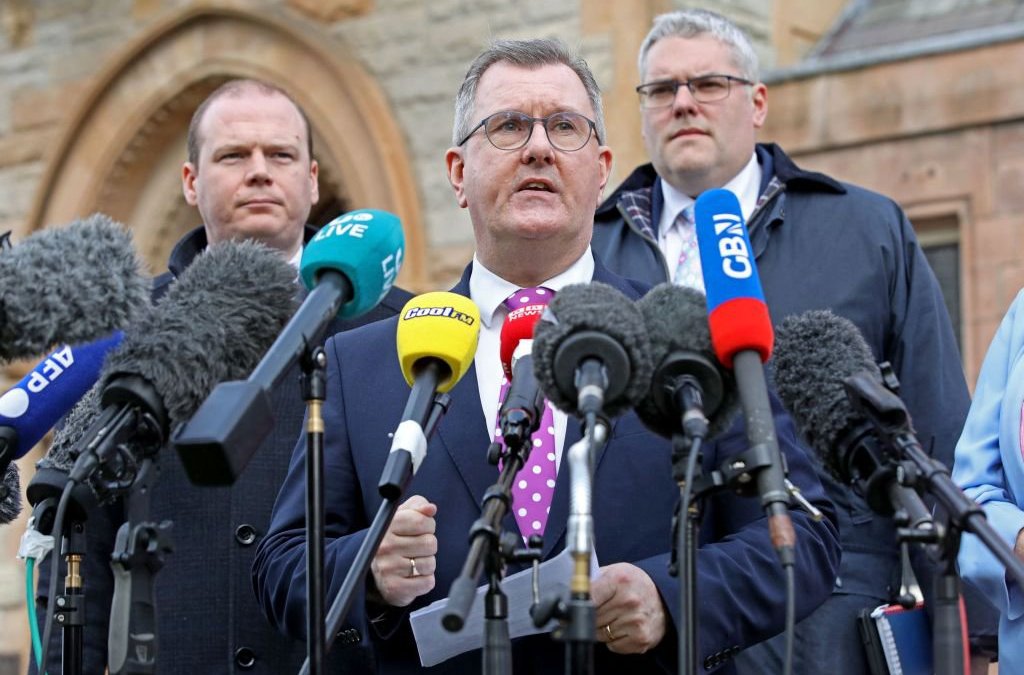Any development, great or small, is viewed by both sides as a factor in the age-old struggle for power between unionists and nationalists
February 28, 2023 4:55 pm
The politics of Northern Ireland were always complicated and the Windsor Framework has made them even more complex. Rishi Sunak has said that his new deal “removed any sense of a border in the Irish Sea”. Since the Good Friday Agreement (GFA) had long ago abolished the border with the Irish Republic, this leaves Northern Ireland with no physical frontiers at all.
The Democratic Unionist Party (DUP) has fallen back on the old cliché about “the devil being in the details” as it tries to decide its response to the proposed agreement between the UK and EU. It is cautious because it knows that the radicalism of the diplomatic breakthrough is being oversold: the customs barrier in the Irish Sea is still there, whatever Sunak may say, and the “Stormont Brake”, the Northern Ireland Assembly veto on major EU laws, is highly conditional.
As always, however, the most dangerous devils in Northern Ireland are not hidden away in the details, but are visibly at work fostering fears and hatreds in one of the world’s most divided societies. Any development, great or small, is viewed by both sides as a factor in the age-old struggle for power between unionists and nationalists, in essence between the Protestant and Catholic communities, each about one million strong.
This conflict seldom takes a violent form these days – though the shooting of a senior policeman in Omagh shows violence is never far beneath the surface – but the sectarian divide is as deep as ever.
This is not to understate the significance of the Windsor Framework, but the problem has never been primarily about the obstacles to importing seed potatoes or steel or other economic issues. Sunak was on Tuesday telling factory workers outside Belfast that the province would have the tremendous advantage of being part of both the EU and British markets – though if this is the case one wonders why Sunak supported Brexit. But in Northern Ireland, the “constitutional issue” always trumps economic benefits.
The DUP is learning once again that, when it comes to a choice between offending Northern Ireland unionists and the EU, not to mention President Joe Biden and the US, then the UK will side with the stronger powers. This was true when Boris Johnson signed up to the original Protocol in 2019, and is even more true today under Sunak whose political future depends on opening up a new conciliatory relationship with Brussels. Overplaying its hand has been the DUP’s mistake ever since the party backed Brexit in 2016 in the mistaken belief that this would scupper parts of the GFA it did not like and would restore a 300-mile long hard border with the Irish Republic.
To their horror, the DUP found that the new border was going to run down the middle of the Irish Sea, exactly the opposite of what they intended. Brexit as it applied to Ireland, turned the partition of the island into an international question, debated in Washington and European capitals for the first time. This is something that Irish republicans had spent a hundred years trying and failing to accomplish. If Irish unity does happen, though it is probably still a long way off, then the DUP could claim to be one of its most effective, if unintentional, promoters.
The DUP opposed the GFA in 1998 and, even though it was later part of a joint executive with Sinn Fein, it was never comfortable with power sharing. This may now be difficult to avoid since “the Stormont Brake” presupposes an operating Assembly.
More from Opinion
But the Assembly up and running creates another problem for the DUP because, for all its talk about “a democratic deficit” in the old Protocol, its own democratic mandate is shaky. Some 56 per cent of the Northern Ireland population voted to remain in the EU in 2016. The DUP has been only the second largest party in the Assembly since the elections last May. A majority of people in the province told pollsters that they favoured the implementation of the old Protocol.
Well known though these facts are, they seldom come across on television and radio in mainland Britain where the DUP is often treated as if it was the overwhelmingly dominant political force in the province. In reality, its mandate is far less than the Scottish Nationalist Party in Scotland whose wishes the Westminster government has no difficulty in thwarting or ignoring.
The reason for this is that the DUP has been allied to a substantial faction, the European Research Group, on the right of the Conservative Party. But one of the most important political developments over the last few days has been the speed with which the support for the DUP has shrivelled in the ERG, as some of its most militant leaders back Sunak. For some, playing “the Orange card” was always a tactic, while for others the need for Conservative Party unity to avoid a calamitous general election defeat takes priority.
There is no easy way out for the DUP leaders to escape from a dilemma which is not entirely of their own fault. Beating the Protestant tribal drum has always been key to success in unionist politics since the first civil rights marches began to destabilise Northern Ireland in 1968. The DUP is vulnerable to the Traditional Unionist Voice which will punish it for any backsliding. At the heart of Protestant political culture in Northern Ireland is the belief that advocates of compromise are either traitors or, at best, are unwittingly undermining the union. Sunak has been finding out this week how strong this tradition is and how difficult it is to break.
Rev Ian Paisley, the late founder of the DUP, was once asked what he thought of building bridges to the nationalist community. “What do bridges do?” he roared back in reply. “They go over to the other side.”



